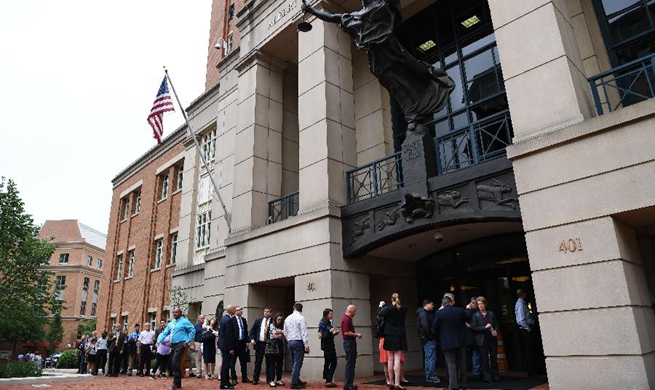LONDON, Aug. 1 (Xinhua) -- Brexit uncertainty is hanging over the British economy, according to a local economics think-tank.
The National Institute of Economic and Social Research (NIESR), an independent London-based think-tank, revealed on Wednesday in its quarterly economic review that the British economy would continue its subdued growth this year, growing by 1.4 percent of GDP.
Growth for next year, during which Britain is set to formally leave the European Union (EU) at the end of March, was forecast at 1.7 percent.
However the NIESR's forecasts come with the warning that the course of the Brexit negotiations and the outcomes of the Brexit process could alter the forecast growth prospects.
Prof. Jagjit Chadha, director of the NIESR, told a press conference in London: "The machinations to exit the EU seems to be dominating the political agenda... there seems to be a stasis in policy -- things that need to be done don't seem to be happening."
Amit Kara, head of UK macroeconomic research at the NIESR, told Xinhua: "We've got greater uncertainty (in our forecast). The risks to economic growth are skewed to the downside, and the risks to inflation are skewed to the upside.
"The most proximate reason for this is Brexit, Brexit will slow economic growth."
The NIESR's central economic forecast assumes a soft Brexit, where Britain negotiates successfully for close to full access to the EU market for goods and services.
Kara said that under the soft Brexit assumption "financial markets continue to work in an orderly fashion and the UK continues to have a very high level of access to the EU for goods and services."
This is somewhat midler than the proposals outlined in the government's White Paper on Brexit goals published last month.
In the White Paper the government has prioritized a free trade area for goods trade and an arrangement for services trade while taking back control of immigration and budgetary contributions.
The NIESR said that it believed the British government would have to "make significant concessions to the EU" to achieve a deal.
The NIESR model showed that the White Paper proposals would see an output loss of 500 pounds (656 U.S. dollars) per person per year over time compared with the NIESR's soft Brexit scenario.
The loss would be around 800 pounds under a "no deal" Brexit, in which Britain crashes out of the EU with no agreements reached.
The NIESR said in a statement that these estimates do not include the likely impact on productivity which could, on some estimates, double the size of the losses.
Kara said: "Brexit is the most important risk facing the UK economy. We are just eight months away from the formal Brexit date, and the entire spectrum of outcomes is still possible -- ranging from a hard, disorderly Brexit to a second referendum."
It was difficult to forecast accurately because the situation was "without precedence."
"No country has left the EU before," said Kara. (1 Britsh pound= 1.31 U.S. dollars)













